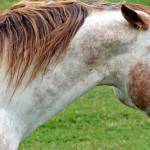Question
I was wondering if should feed my horse oats or beet pulp. I've seen lately many articles on feeding them instead of commercial concentrates to horses, but I am confused as to which is best because the article lists both advantages and disadvantages. Are there major differences in one diet over the other? Do feed amounts matter? My horse is an easy keeper, so he really only gets enough grain to eat his supplements and not feel left out while the other horses are eating.
Answer
If you are feeding a small quantity per day (less than 1 lb or 0.45 kg), neither oats nor sugar beet pulp would offer a more advantageous nutrient profile over the other.
Oats are included in horse diets primarily as an energy source, as they contain about 44% starch. The starch has high pre-cecal digestibility, making it safe to be fed at high levels. The addition of oats may add a little pep to your horse’s step due to the nonstructural carbohydrate content.
On the other hand, beet pulp is low in starch and is usually added to diets and commercial feeds to increase the amount of digestible fiber. Because it is rich in fermentable fiber, particularly pectin (42% neutral detergent fiber), beet pulp is thought of as a super fiber. If you are looking for a feedstuff to act as a carrier for supplements, I recommend beet pulp, as some horses may not readily consume straight oats or may sift out powdery supplements. I suggest soaking the beet pulp prior to feeding, especially if giving more than 2 lb (1 kg) per meal. If you offer pelleted beet pulp, you might consider soaking to reduce the risk of choke and increase palatability. However, some horses do completely fine when fed unsoaked beet pulp.
If you decide to offer oats, beet pulp, or a combination of the two, the diet will need to be balanced for vitamins and minerals. Providing a micronutrient supplement, such as Micro-Max (KERx Gold Pellet in Australia), would ensure all vitamin and mineral requirements are met.








